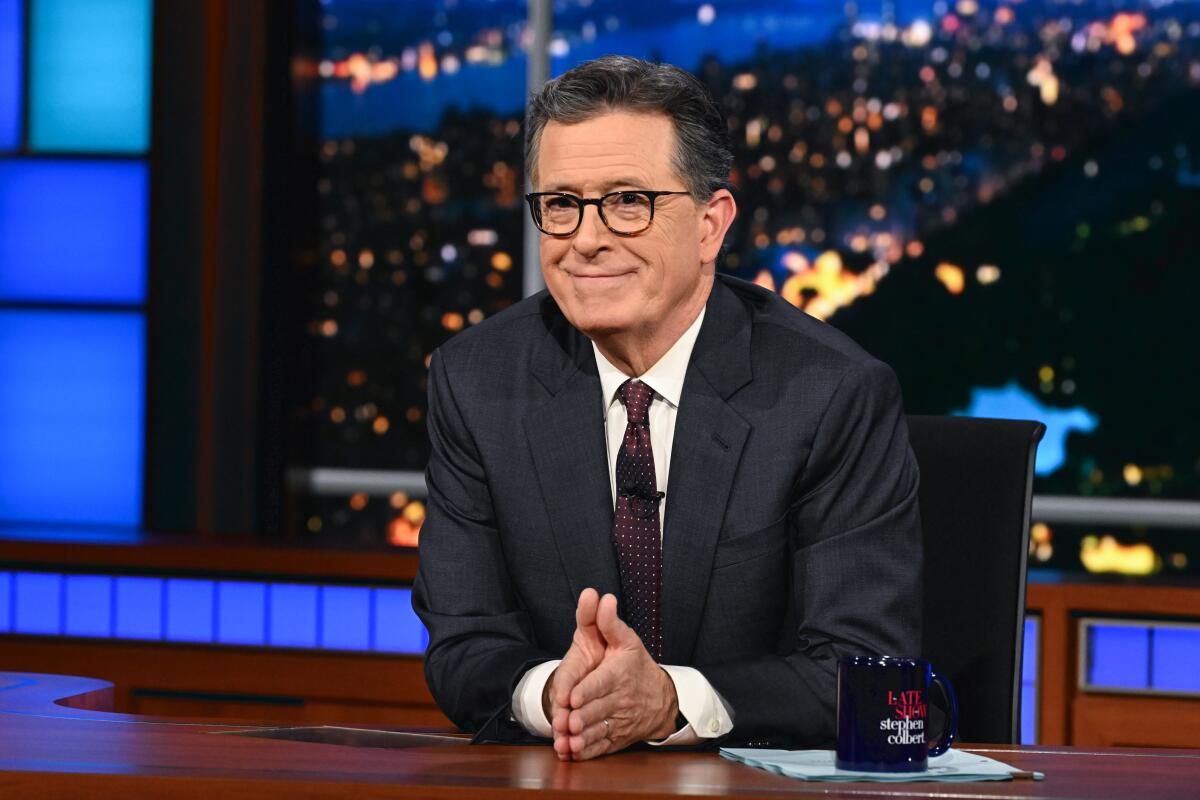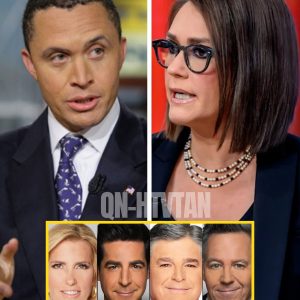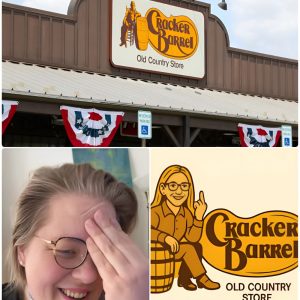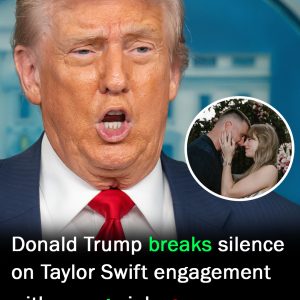On a typical evening, Stephen Colbert’s The Late Show is synonymous with sharp wit, hilarious monologues, and entertaining guests.
However, on a fateful night in late July 2025, the tone of his usual comedic set was upended, creating an atmosphere of unease, introspection, and even fear.
In a chillingly calm monologue, Colbert didn’t raise his voice, crack a single joke, or offer an easy laugh. Instead, he did something far more profound:
he showed his audience what had been hidden from them for too long, and in doing so, he triggered a massive uproar that would reverberate across networks and studios.
A Routine Segment Gone Awry
It all began innocuously enough, with Colbert discussing an event that appeared to be a throwaway topic. As usual, the segment involved a mocking nod to the latest news. On the screen, a footage clip flashed, showing a familiar figure in a plaid tie, flanked by officials under the drizzle of a Scottish sky. The story appeared to be about a new golf course, a handshake deal, and yet another in a long line of international trade agreements. For a moment, this was just another mundane political talk wrapped in Colbert’s signature sarcastic commentary.
But what happened next took the audience—and the entire television network—by surprise.
The Golf Course, the Trade Deal, and the Unseen Truth
In his typically dry manner, Colbert quipped that it was “the fourth course in the region,” referencing the golf course in question, and added that it was also the fourth time no one seemed to explain exactly what was being traded. The chyron at the bottom of the screen, reading “D.Tr Visits Scotland. Again. Also: There’s Caesar Salad,” delivered the joke that Colbert had expected to serve as the punchline. The audience chuckled, but Colbert, almost uncomfortably so, did not. He sat still as the applause died down, tapping his pen once on the desk, the stark silence ringing louder than the laughter that had preceded it.
And then it happened. He transitioned, calmly and matter-of-factly, to a very different subject, saying, “But while you were watching the golf ball, someone else was watching Ghislaine Maxwell.” The room temperature dropped.
A Chilling Shift: The Unseen Web of Connections
In a sudden departure from his usual comedic approach, Colbert’s delivery shifted. He didn’t laugh. He didn’t offer a punchline. Instead, he simply let the words land, their weight and implications hanging thick in the air.
Colbert continued in his trademark deadpan delivery, revealing facts that, in his words, “were not supposed to be glued together.” He spoke of an attorney tied to the person in question visiting Ghislaine Maxwell in her Florida facility, the visit occurring with no media coverage, no fanfare, and a conveniently hidden camera angle. The unsettling detail didn’t end there. Colbert revealed that the visit coincided with leaked documents that connected Maxwell’s previous accounts to shell companies, which in turn appeared to overlap with hospitality investments—two of which were, curiously enough, located in Scotland.
In a moment of unflinching clarity, Colbert asked, “Is this a prison visit, or a calendar check?”
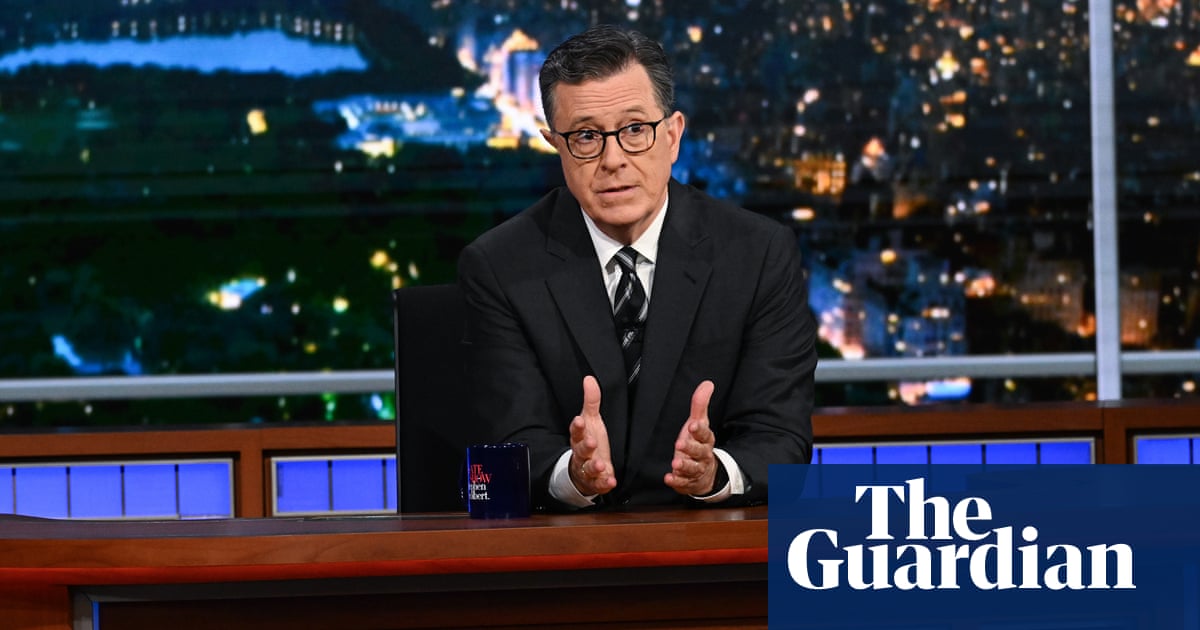
The Impact of Colbert’s Words: A Network in Crisis
The studio fell into an eerie silence. No laughter. No applause. Colbert did not continue with the usual rhythm of his show. Instead, he stared directly into the camera, making sure that each word, each statement, was consumed with the same level of gravity.
Then, Colbert unleashed a truth so simple yet so unsettling: “We used to call them criminal associations. Now we call them partnerships.” The mood in the room shifted, and so did the mood of the audience at home. The mere mention of Maxwell and the implication of an elusive network of connections felt too real, too timely.
CBS executives, according to sources, were reportedly scrambling. It wasn’t just another late-night commentary. It wasn’t just political satire. It was a daring exposé, delivered with the casual ease of a late-night host, but with the clear intent of something far more significant. As the night drew to a close, network officials were reportedly debating whether to address the implications of Colbert’s statement or attempt to downplay it. For them, the real question wasn’t about the integrity of the show’s content—it was about how much longer this type of uncensored discourse could be allowed on mainstream television.
A Cultural Shift: What Does It All Mean?
Colbert’s unusual segment was an open challenge to the polished and censored narrative often presented to the public in the form of nightly news and entertainment. For years, late-night television, while known for its biting satire, has also adhered to certain boundaries. Comedians like Colbert have often pushed the envelope, but they rarely take direct aim at issues so tangled in legalities and political entanglements.
The significance of the golf course was not in its location, its luxury, or its newness. It was in its role as a symbol—a representation of how deals are made, how power shifts, and how certain figures operate in the shadows. The connection between this golf course and the unspoken ties to Maxwell’s network served as a thread that, when pulled, began to unravel a much larger, more uncomfortable picture.
In his quiet, composed manner, Colbert highlighted a growing dissonance within the narrative the public is fed. His statement that “it’s not a conspiracy” emphasized that these were not far-fetched speculations or the work of those who thrive on controversy. Instead, he presented a disturbing reality: the circumstances surrounding these connections were so precise and so coincidental that they could not be ignored. It was, in Colbert’s view, an unusually busy week for someone who professed to no longer be involved in politics.
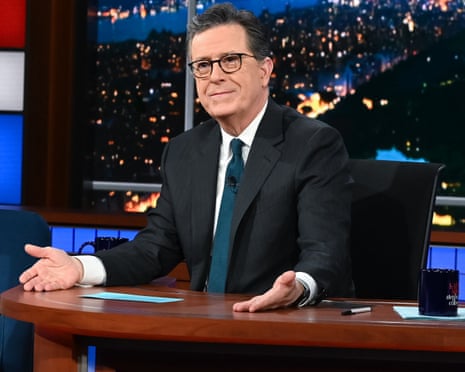
The Aftermath: Hollywood’s Response
In the days following Colbert’s broadcast, the reaction from Hollywood and the entertainment industry was swift and intense. Some praised Colbert for his courage to air these connections, seeing his decision as an act of journalistic integrity in a world where powerful figures often operate behind closed doors. Others, however, expressed concern about the consequences of such bold, direct commentary. In an age where every word is scrutinized, Colbert’s segment raised the stakes for what late-night comedy could and should address.
The networks, too, were caught in a whirlwind of uncertainty. While Colbert’s show had always operated at the fringes of political discourse, this was an entirely new level of engagement. His delivery was not an attempt to entertain; it was an invitation to question. To inquire. To dig deeper into a world that often keeps its secrets just out of reach.
The Path Forward: Will We See More?
As networks grapple with the fallout from Colbert’s unexpected shift in tone, questions loom about the future of late-night programming. Will other hosts follow in his footsteps? Will networks begin to take a harder stance on content that challenges the status quo? Or will the fallout from this episode mark a turning point, a warning that certain lines should not be crossed?
What Colbert accomplished on that night in July wasn’t just the breakdown of a comedic segment—it was the opening of a dialogue that Hollywood, the media, and society at large are not prepared for. Colbert may have delivered his message with the usual deadpan wit, but the implications of what he said are anything but lighthearted. As viewers continue to process the gravity of his words, it remains to be seen whether this will be remembered as a defining moment in television history, a cautionary tale, or a new wave of truth-telling that shakes the very foundations of mainstream entertainment.
In the end, Colbert’s chillingly calm delivery left a lasting message: sometimes, it’s not the volume of the words you speak that matters—it’s the silence in between them.
